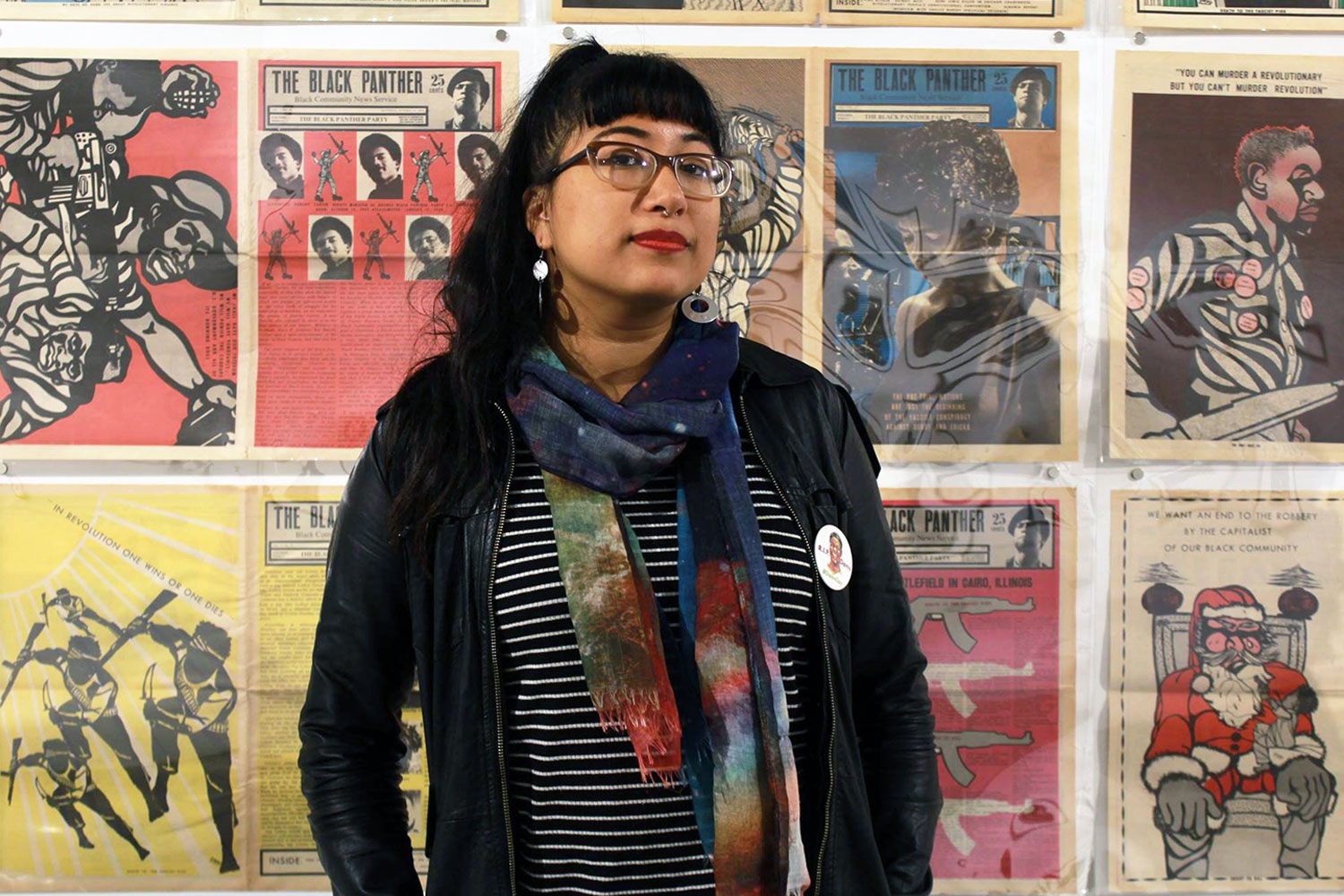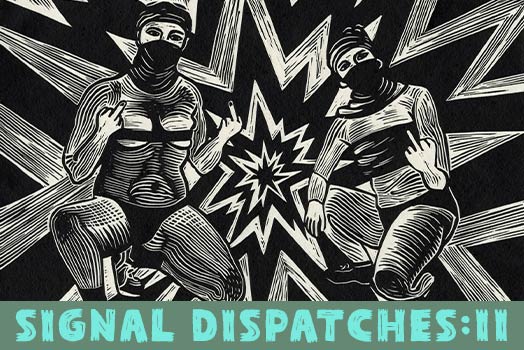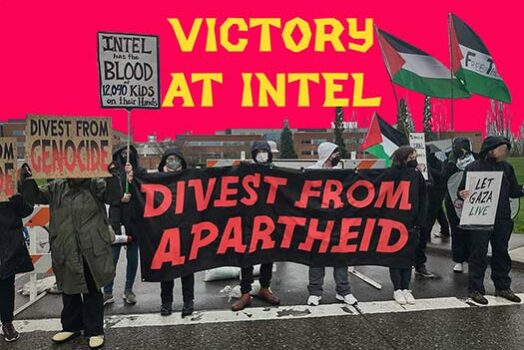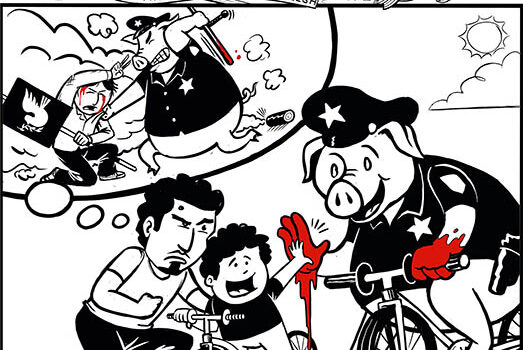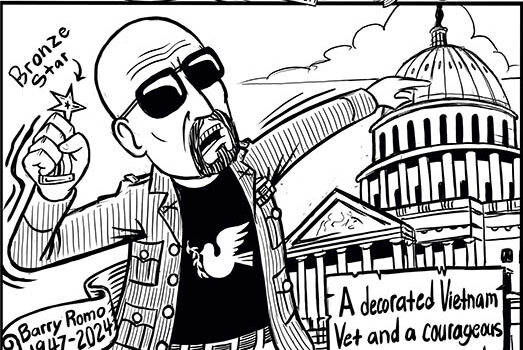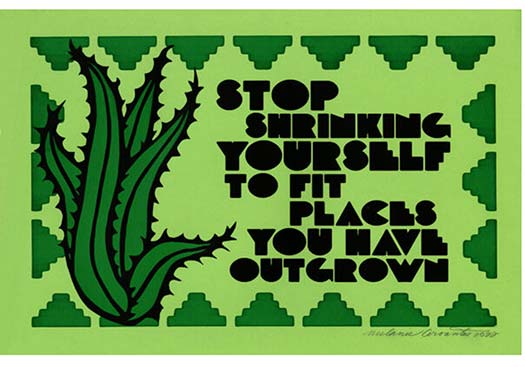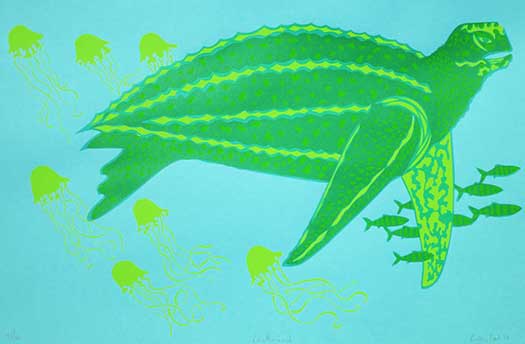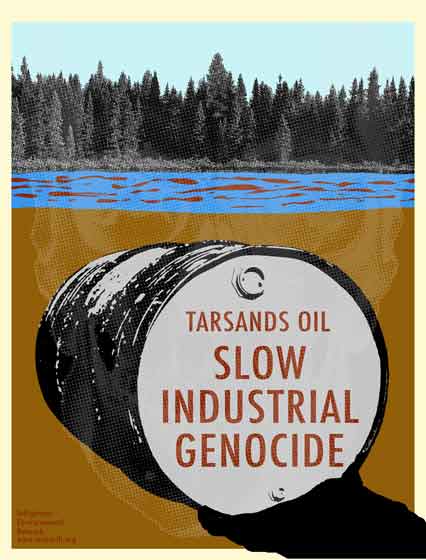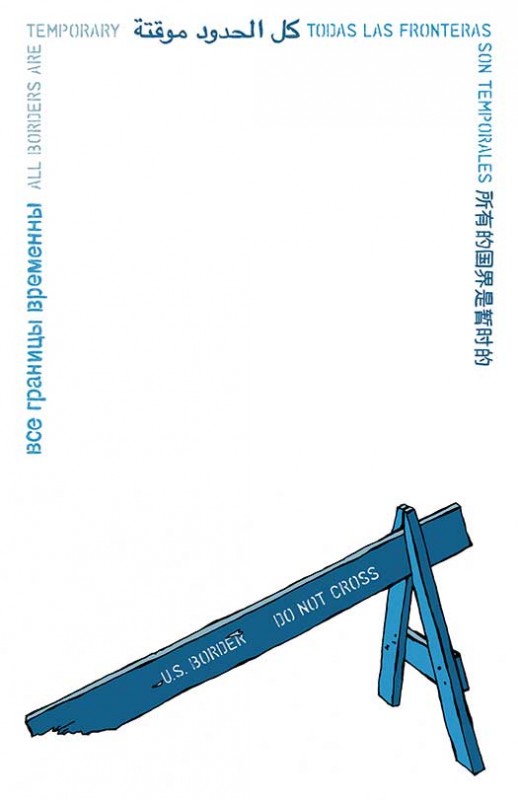Monica Trinidad is an inspiration and transformational force in the Chicago arts and activist community. She is a queer Latinx abolitionist artist, activist and organizer with a clear vision of arts’ essential role in political movements.
Born and raised on the southeast side of Chicago, Monica has deep local roots and a long history of being involved with some of the most powerful creative political projects in the city including: We Charge Genocide, NoCopAcademy#, Brown & Proud Press, For the People Artists Collective, the People’s Response Team, and the Lit Review Podcast.
Many people in the Justseeds community might be familiar with Monica’s illustration for the cover of the NYTimes best selling book We Do This ‘Til We Free Us: Abolitionist Organizing and Transforming Justice by prison abolitionist Mariame Kaba or her Reparations Now, Reparations Won poster for the Celebrate People’s History series. She is also a part of the new cohort of Justseeds members who joined the cooperative last year. Her print We Are All Bound Up Together: 19th Amendment History uplifting the historic leadership and legacy of Black women in the women’s suffrage movement is now available through Justseeds. A fitting release for Women’s History Month.
In hopes to more fully introduce Monica’s powerful work with the wider Justseeds community, Monica and Aaron connected to discuss some of her projects, dig into her creative process, and talk about what inspires her.
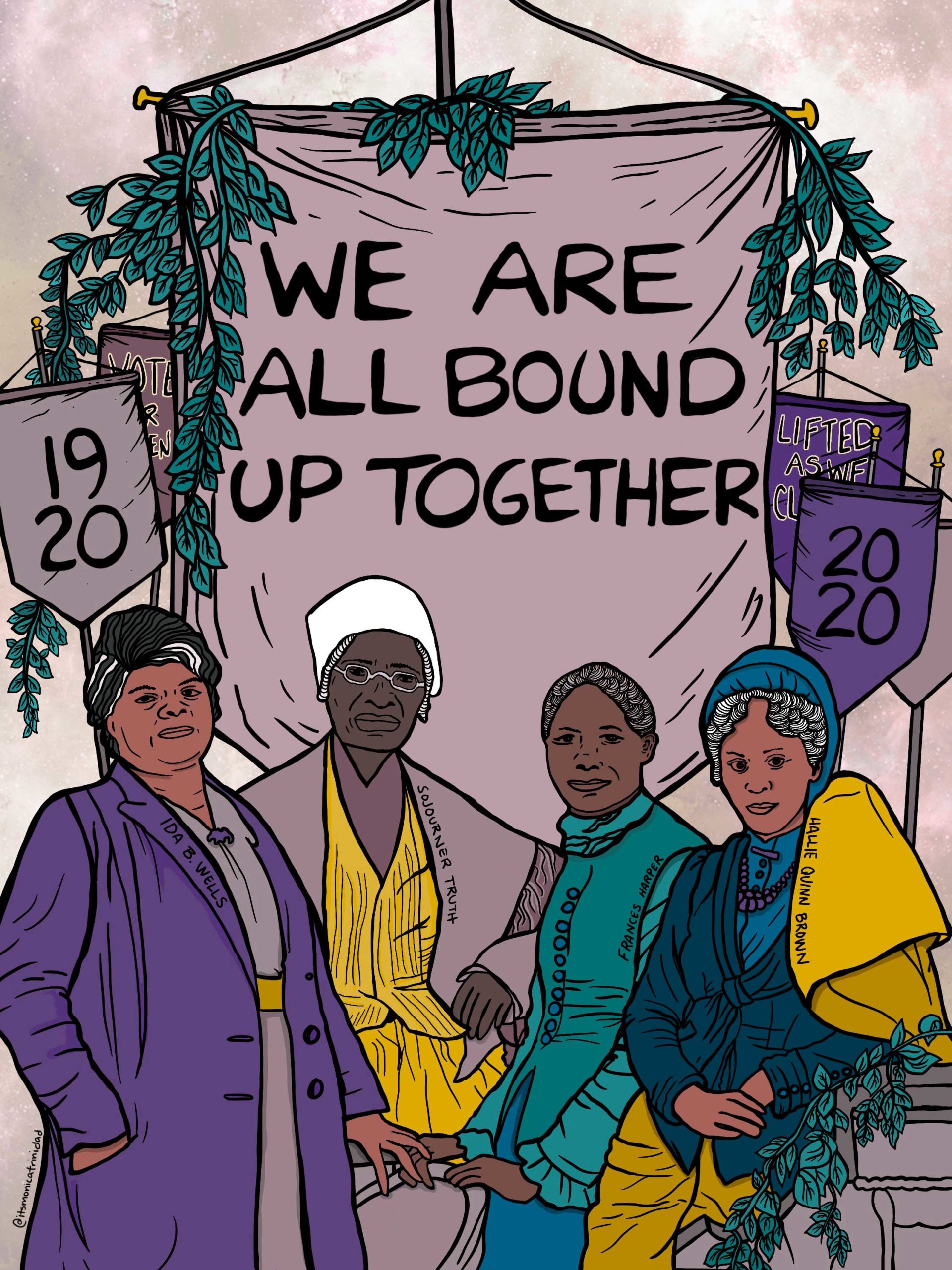
We Are All Bound Up Together: 19th Amendment History, Monica Trinidad
Aaron Hughes (AH): Your creative practice has a dynamic synergy between drawing, design, activism, organizing, and education. What do you think about the relationship between art, activism, organizing, and education? Are there specific artists that inspire you?
Monica Trinidad (MT): Thank you for that. I’m really looking towards other artists who uplift movement work to understand the whole process. There’s a really complex relationship between art and organizing. I think of long time movement artists like Emory Douglas, Billy Dee, Mary Patten, Micah Bazant, and Melanie Cervantes who have been creating artwork to document resistance for so many years. Their work demonstrates just how powerful the work can look and feel when there’s been an intentional and honest conversation between the artist and the organizer. I have to constantly remind myself that the process is important when I feel called to create work on a particular issue that I’m new to.
I also think about the speed at which artwork like posters and graphics can move a person from emotions to actions so much quicker than a book, article, or documentary series can. Rapid response artwork is so critical to successfully responding to crises in our communities. That’s why the relationship between art and organizing is so complex.
It’s experimentation with accountability and envisioning a different and better world. Sometimes you mess up. Sometimes you create magic. It’s frankly abolition in practice.
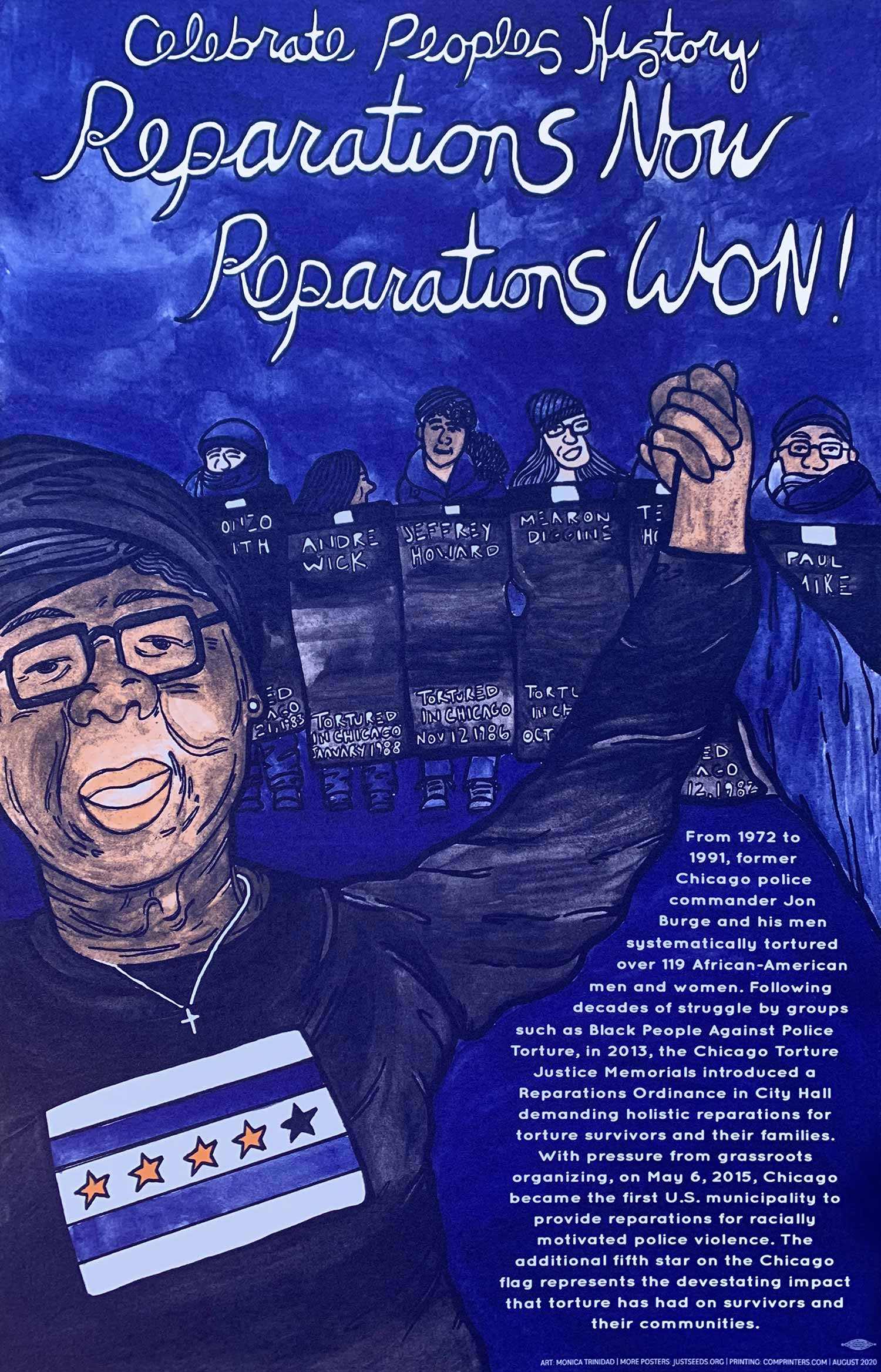
Reparations Now, Reparations Won!, Monica Trinidad
AH: Reparations Now, Reparations Won! is one of the new Celebrate People’s History prints released last year and is a powerful addition to the series. For the people that dont know about the reparations campaign for Jon Burge Chicago police torture survivors can you give a brief overview of the campaign and why it was important for you to highlight this campaign?
MT: The #ReparationsNow campaign was one of those few and far between moments when we actually won something that felt really impossible. To be the first municipality in the history of the U.S. to provide real reparations to survivors of police torture and violence is huge. And it happened. Between 1972 and the 1990s, former Chicago police commander Jon Burge and his men tortured over 119 Black people to solicit false confessions. Many people were incarcerated, and still are. There were decades of struggle that took place with hundreds of different activists and organizers moving the struggle forward in various capacities; survivors and their mothers being absolutely pivotal. In 2013, the campaign took off when the Chicago Justice Torture Memorials, a group of activists, organizers, lawyers, and artists, introduced a reparations ordinance to City Council demanding holistic reparations for survivors and their families.
From my own personal experience, it was this culminating moment when this effort met the energy of We Charge Genocide’s efforts to end police violence in Chicago, it created this sort of electrifying juncture, and in 2015, the ordinance passed.
Folks can read more about everything that was included in the reparations ordinance here. Also want to note that folks involved in the Chicago Torture Justice Memorials are still fighting for the city to enact the final piece of the ordinance, which is the permanent, public memorial.
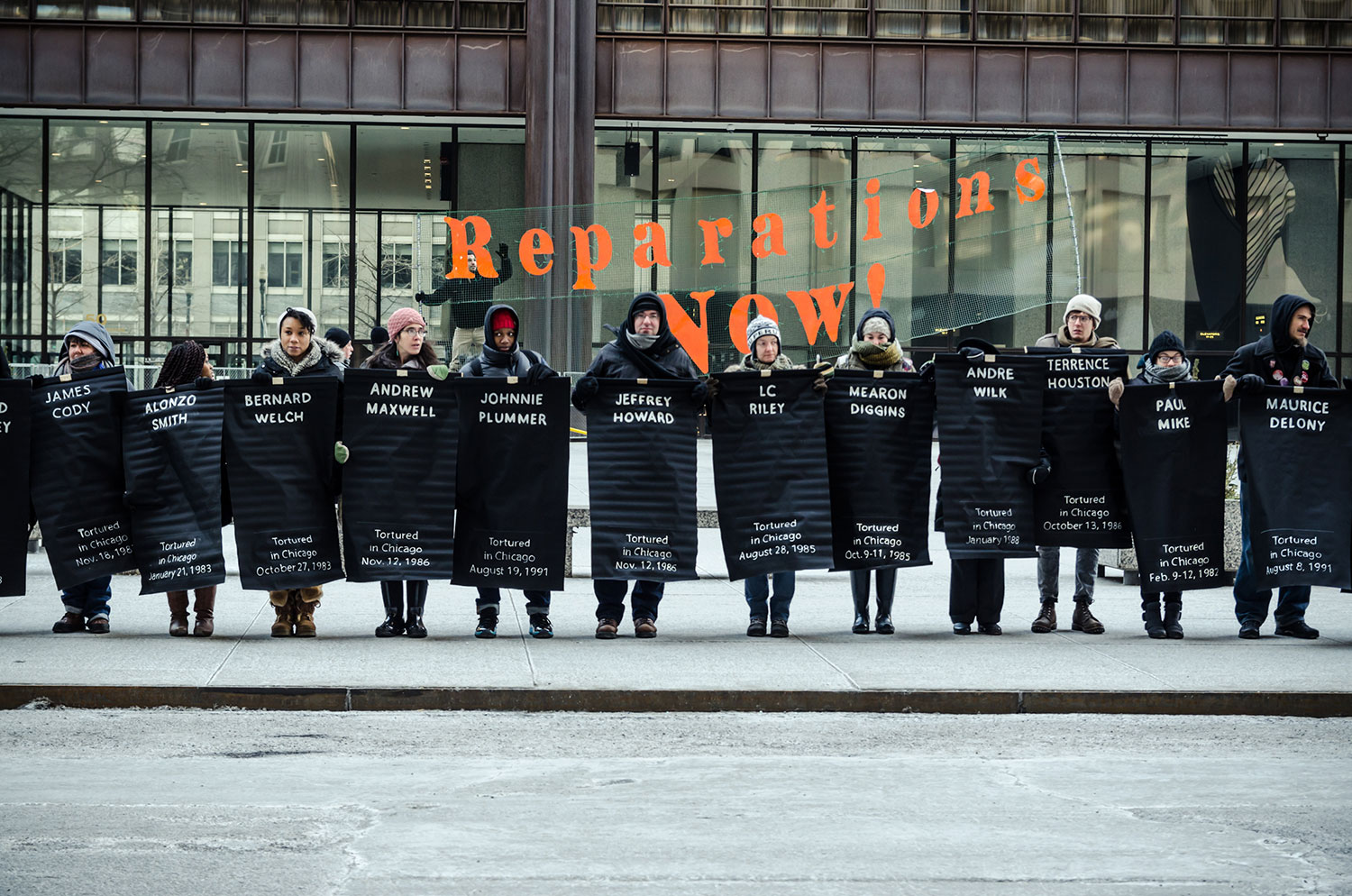
Chicago Torture Justice Memorials action. Photo credit Love & Struggle Photos
AH: How did this campaign influence your thinking around art, activism, and organizing?
MT: The thing I truly loved about this long-term campaign for reparations was that the organizers were visionary, many of them artists themselves, and utilized art in truly creative ways to not only amplify the work, but to ground the work in persistent visions of demanding more than just what’s right in front of us. Not only did they fight for reparations for the torture survivors, but for their children, their grandchildren, and the communities they came from/are a part of. That was so powerful to me, and is a testament to the power of art being a forethought in our organizing work. Art and culture not only supports the visibility of our movement work, but it’s actually essential to our strategies.
AH: What is inspiring you right now?
MT: I’m definitely inspired by the waves of mutual aid and care work that have been happening all across our communities. I’m seeing organizers who used to work themselves into the ground, year-round, now taking big breaks after major projects or campaigns. I’m seeing new activists and organizers building on and acknowledging the work that came before them, and then taking the lead in really beautiful ways. I’m seeing folks organizing care packages and meal trains for folks on a consistent basis, incredible food and mask redistribution sites, rapid-response organizing for clean air and more funding for resources, not police, and so much more. But it’s the shifting waves of people I’m seeing doing all of this work that is extra critical and inspiring. It tells me that we’re getting better at creating healthy boundaries and building sustainable movements for ourselves to keep doing this life-long work. That’s really inspiring to me right now.
I hope people remember that we learned how to do a lot of this mutual aid and care work from Black and brown queer and trans disabled and chronically ill organizers and activists.
AH: In these hard times, I know a lot of artists and activists are struggling to stay active and create. How are you staying motivated and navigating all the current and historic violence and oppression in the world?
MT: There’s some questions I try to ask myself when I’m feeling really called to create artwork about a political moment or campaign or effort to uplift, but not feeling physically or mentally ready. I ask myself, do I have the capacity for this, not just physically or mentally, but emotionally? Have I reached out to frontline organizers to understand their goals, and if my artwork will be in alignment with their goals? And what will this artwork do to participate in challenging oppression in the world?
I know those are some big questions, but it’s important for me to make that an active practice, and I hope more artists can do the same. But don’t force yourself to create. Your work will come to you when it’s ready.
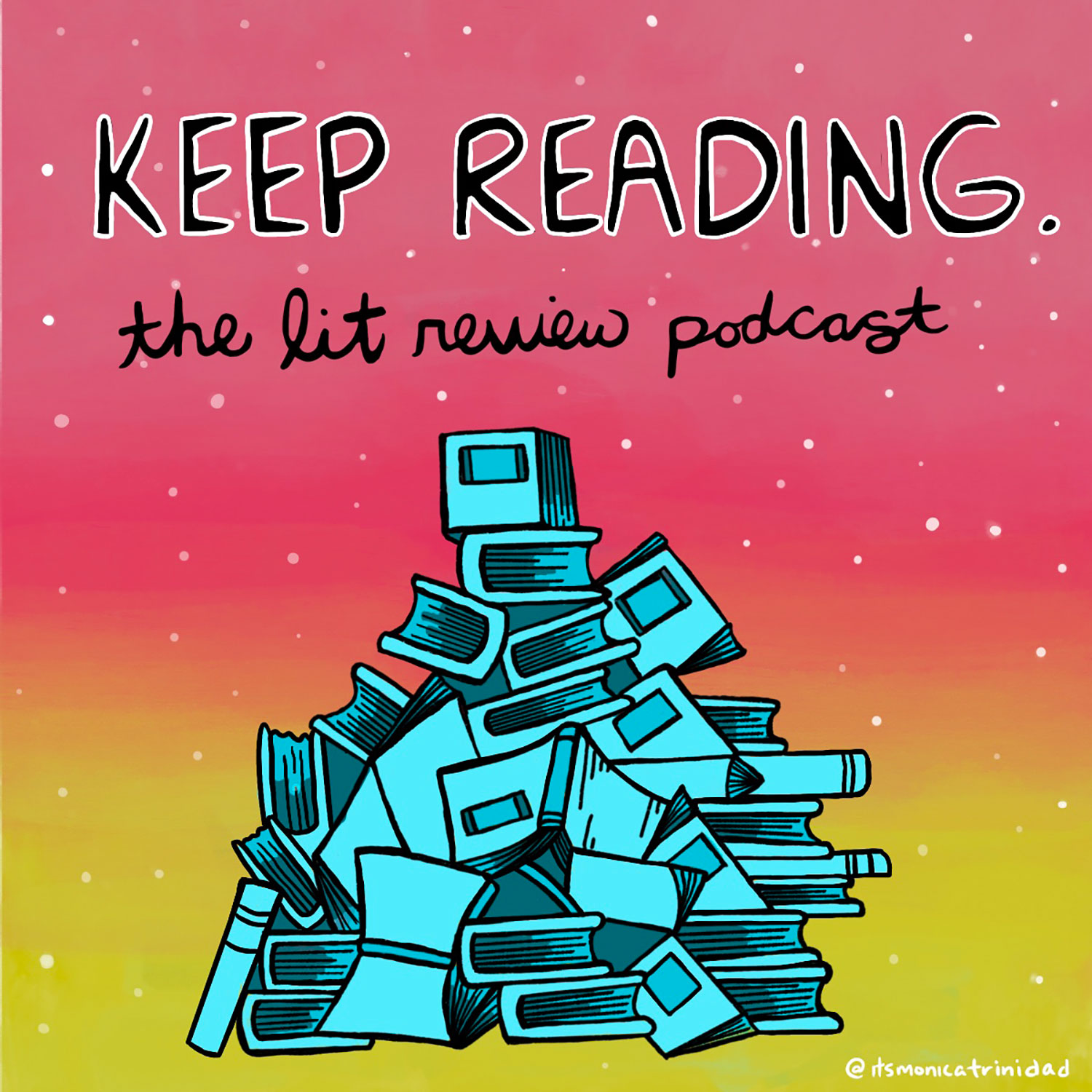
the lit review podcast, Monica Trinidad
AH: Your podcast the Lit Review with Page May is so powerful, informative and personal. You have hosted so many amazing activists as they share a book particularly influential to them. What inspired you to organize the podcast? Or what do you hope people get from the podcast?
MT: We started the podcast in 2017 as just part of a larger organizing strategy! Trump was about to be inaugurated and we were scrambling to prepare for that impending crisis. Page and I were in these meetings with dozens of other racial justice organizers in Chicago and we were all brainstorming things we needed to do to continue building a strong resistance to the incoming white supremacist administration. One of the many ideas was to create a podcast that made space for the political education that often gets lost in the midst of urgent, rapid-response mobilizations and calls to action, which we knew would inevitably pop off.
Here we are, 57 episodes plus a few years later, and still going!
We’re reminded on a consistent basis how important the podcast is to people in our communities. People who are high school teachers or college professors, people who have a hard time getting through books so they listen to our conversations on the book instead, people who are just trying to learn more about the Black Radical Tradition or trans history, and people who just really love podcasts.
Sometimes I get self-conscious about what I might’ve said in 2018 as we are now in the year 2021 and…we all know our politics evolve! It can be hard knowing people still listen to super old episodes, but I also hope that people do keep listening to them and are just gracious about it, because there’s gems from our guests in every single recording.
AH: Is there a particular interview and book that influenced your own thinking?
MT: I would definitely say Episode 28 with Bill Ayers on his book Demand the Impossible. The whole thing was just everything we had envisioned for the podcast, come to life. We were sitting in Page’s apartment in Washington Park in the fall of 2017, sitting with someone we both deeply admired who has such an incredible organizing story.
Right before that, a few blocks down at an L station, we had just seen off a group of people: kids, teens, and adults who were about to participate in a “train takeover” for the #NoCopAcademy campaign. For those that aren’t familiar, a train takeover consists of a large, organized group of folks getting on train cars, leading “mic checks” to share information about a campaign as loudly as possible, getting some energetic chanting going, documenting/“live-tweeting” on social media, and then handing out flyers and being in conversation with riders about the campaign and ways they can plug in. It’s a really creative type of action that’s been done many times before us. This one in particular caught the eye of Chance the Rapper on Twitter. He ended up retweeting a photo from the action and the campaign just got a ton more visibility from there.
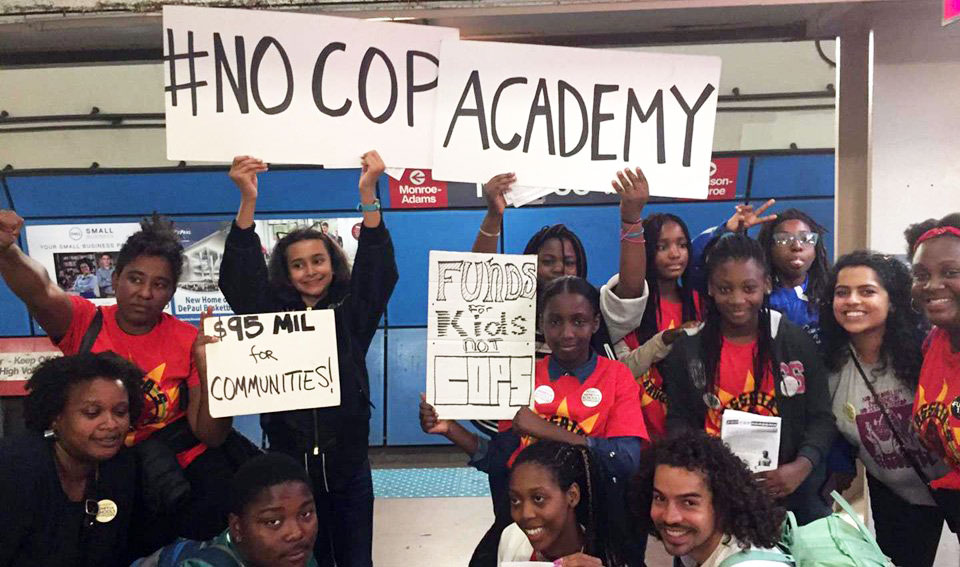
First #NoCopAcademy train takeover. Photo credit Assata’s Daughters
But back to Page’s apartment, we’re recording this episode with Bill Ayers and he just has so much brilliance to share, it was almost hard to remember that we were interviewing him and not just listening! I often go back to listen to pieces of that episode just to hear his affirmations on how we need even more imagination and creativity in our movement work today.
AH: What are you working on now/next?
MT: Well at the moment, I’m definitely celebrating the release of Mariame Kaba’s new book, We Do This ‘Til We Free Us: Abolitionist Organizing and Transforming Justice, edited by Tamara Nopper, published by Haymarket Books, and cover artwork by me! Mariame and I have been collaborating on art projects together for several years now; from zines, posters, flyers, buttons, and now, book covers! It was an honor.
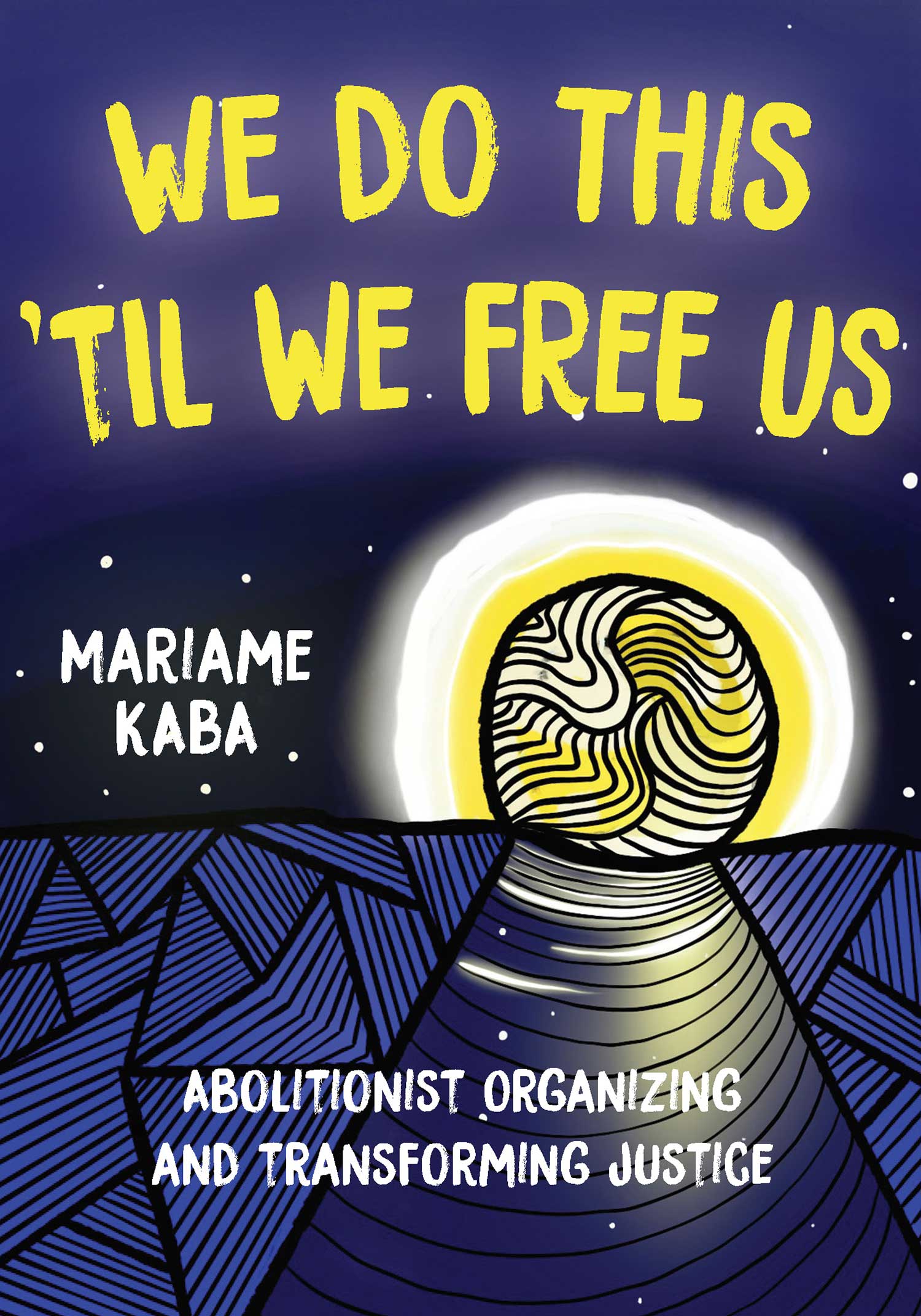
We Do This ‘Til We Free Us: Abolitionist Organizing and Transforming Justice book cover by Monica Trinidad
I’m working on getting some limited-edition posters of the cover artwork printed to financially support her 2021 Abolitionist Youth Organizing Institute this summer. I’m also working on a new poster to support the work of Catatumbo Cooperative Farms, a queer, BIPOC-led farm on the southeast side of Chicago, which you can see a sneak peek of on my Instagram!
Lastly, I’m working on a collaborative print with another justseeds member (Fernando Martí) for the 2021 justseeds CSA! I’ve never created a collaborative print with another artist, and definitely not virtually, so it’s an experimentation for sure! I hope that later this year I can get back into more hands-on art-making, hosting art builds for local efforts, and maybe curating some small exhibitions!
Monica Trinidad is a queer artist, organizer, podcast host, and comms strategist based in Chicago, IL. She is a Justseeds member and co-founder of For the People Artists Collective, Brown & Proud Press, the Lit Review podcast, and the People’s Response Team.
You can see more of Monica’s work and contact her through her Justseeds page or personal website.
Links:
